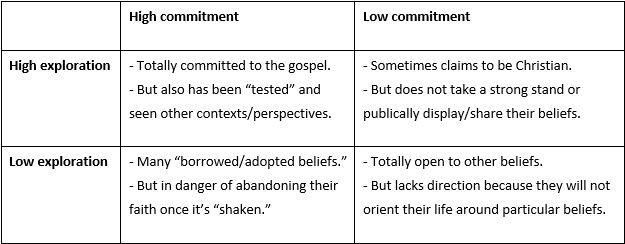In my last post, I explored the tension that is often faced in worship between exalting truth or experience and how postmodernism points toward experience as the chief goal of worship. But two other tensions rise to the surface as I think about the effects postmodernism has had on the church, and I want to lay out another one of those in this post.
Reactionary Culture Shifts, aka Pendulum Swings
Some culture shifts happen because of advances in technology, but it appears that current culture shifts tend to be reactionary. This happens when the values someone embraces are largely influenced by seeing or experiencing the negative effects of alternative values. For example, if you work as a waiter/waitress and become frustrated of people leaving without tipping, the importance of tipping—and how much you tip—may increase in your mind as you experience this over and over. Or, if you get overly hassled for messing up an order, you may begin to become more gracious—even purposefully overlooking it—when someone at another restaurant messes up your order because you don’t want to be like those other people. Your values adjusted based on negative experiences.
This may partly explain the polarization that is taking place politically. When the news and social media are largely filled with the negative things happening because of the alternate views those other people have, values will continue to diverge and little understanding will take place across the divide.
Committed vs. Open-minded
This type of reactionary shift in values is perhaps responsible for the tension that now exists between commitment and being open-minded. Is it wrong for a person to be so committed to their beliefs that they are closed off to the beliefs of someone else? Is it more important to have firm beliefs or an open mind?
The culture appears to be leaning toward a higher value of open-mindedness, maybe, in part, because of the untactfully delivered dogmatic truth of the previous generations. It’s not too hard for someone to imagine the example of that person who uses the Bible as a bat and responds to “why” questions strongly—yet no more specifically than— “because the Bible says so.” The resulting shift away is going to want dialogue over dogma and openness over commitment.
Exploring the Tension
It’s helpful to first question whether these two things—commitment and openness—are even in opposition to each other. For example, by having an open-mind do we mean (1) the ability to listen and learn from others or (2) avoiding beliefs that contradict others?
There certainly is irony in telling—and sometimes requiring—someone to change their beliefs because it doesn’t embrace or allow for the different beliefs of someone else. For example, modern culture will categorize Christians as a hate group because of their “inherently offensive and abusive beliefs,” yet their beliefs are likewise offensive/abusive to a Christian.
Nonetheless, the concern is that this can cause Christians to hesitate sharing their beliefs—or even compromise their beliefs—because they don’t want to contradict or offend someone who believes otherwise.
To understand the relationship between the two, I’ve borrowed a helpful chart to explore the pros and cons of commitment and exploration [1]. In this chart, high and low commitment are on the x-axis, and high and low exploration are on the y-axis. I’ve filled in the chart below, adjusting the descriptions to align with the topic we are discussing. I don’t mean to equate openness and exploration, because exploration is often good. But when openness couples with exploration in order to hinder commitment, that is where the problem lays.

Postmodernism, as it relates to this chart, influences believers toward a low commitment to the gospel. As the pendulum swings in reaction to that person who is obnoxiously divisive and overly dogmatic, the result is believers who will increasingly hesitate to believe or publicly affirm anything that would cause division or disagreement. They just don’t want to be like that person. The “subtle pressure” then becomes “to dumb down, dilute, and minimize the gospel” [2].
Love Requires Commitment
The biblical concern is that love requires commitment. Our resolve for embracing and standing for the truth of the Gospel of Jesus Christ is in direct correlation to our love for God and others.
“If you love me, you will keep my commandments” (John 14:15). These commandments include standing firm in the faith (1 Cor. 16:13), devoting yourself to the public reading, teaching and exhortation of Scripture (1 Tim. 4:13), not being ashamed of the testimony about our Lord (2 Tim. 1:8), etc.
Love Requires Contradiction
We express our love for God by our commitment to the truth of his gospel. Though “truth is by nature divisive,” as MacArthur puts it, “it’s far more important to be divided by the truth than united by error” [3]. Jesus said, “Do you think that I have come to give peace on earth? No, I tell you, but rather division” (Luke 12:51). The peace that Jesus brought is primarily between God and man and between fellow brothers and sisters in the family of God. There is—and should be—oneness in God’s family.
How to Lovingly Contend for the Faith
How then should believers share and defend the truth? Paul makes an appeal to “contend for the faith” (Jude 3), which makes it sound as if the Bible wants us to be like that person who uses their Bible quite literally as a weapon.
Paul’s second letter to Timothy is the best passage that comes to mind in answering this question. He writes,
“Have nothing to do with foolish, ignorant controversies; you know they breed quarrels. And the Lord’s servant must not be quarrelsome but kind to everyone, able to teach, patiently enduring evil, correcting his opponents with gentleness. God may perhaps grant them repentance leading to a knowledge of the truth and they may come to their senses and escape from the snare of the devil, after being captured by him to do his will” (2 Tim. 2:23-26).
A few things to note from this passage:
- It is not inherently arrogant to recognize you have the truth and someone else needs to “come to their senses.”
- Believers should seek to avoid controversies about minutia, but instead, like Paul, “will not venture to speak of anything except what Christ has accomplished” (Rom. 15:18).
- Contradicting error is an important skill for the believer, being “able to teach” the truth and “correct his opponents.”
- The best way to tactfully contradict others is by being “kind to everyone,” “patiently enduring evil,” and “correcting… with gentleness.”
- The goal is not dropping a truth bomb in order to blow your opponent out of the water, but rather that God would “grant them repentance leading to a knowledge of the truth” and that they would “come to their senses and escape from the snare of the devil.”
Applying this to Social Media
I wonder about the implications of this just in the twitter world. Are we engaging with foolish, ignorant controversies? Are we breeding quarrels? Or are we tactfully teaching truth in a kind, patient and gentle way, out of a loving desire for God to graciously grant others repentance and freedom from the devil? More concisely, are we further stirring up the pot or are we winning others over to a better understanding of God?
If our goal is the former, my practical encouragement is that we prayerfully respond to the error around us. You’re seeking to spread God’s Gospel tactfully, so ask Him for wisdom. You’re seeking to demonstrate God both in the message you share and the manner you share it, so ask Him for strength—sometimes it’s very hard to be patience and kind. But most importantly you’re wanting God to change hearts, so ask Him to work.
We’ll need to resist the quippy mic drops, and instead labor to prayerfully build up those around us through the Gospel.
May our responses aim for reconciliation and our delivery aim for deliverance. And may God change hearts in spite of our weaknesses.
Coauthored by Garrett Martin, current BJU Seminary student and special assistant for communications and content development.
[1] James Marcia created these four quadrants. David Setran and Chris Kiesling’s book “Spiritual Formation in Emerging Adults” helpfully explains these quadrants on pages 62-70.
[2] This quote is from page 107 of D.A. Carson’s helpful book, “The Intolerance of Tolerance.”
[3] From “Strange Fire” by John MacArthur.








